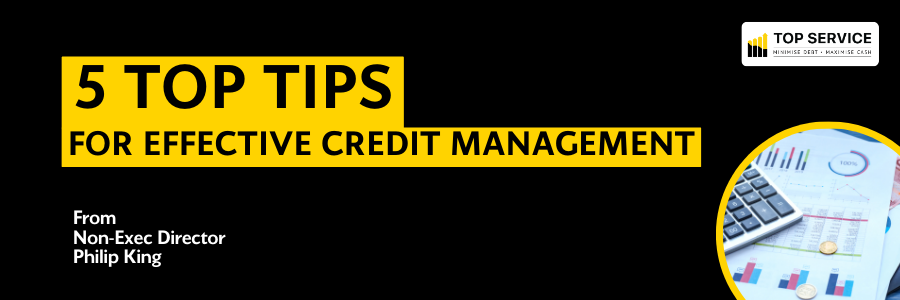Top Service News
Non-Exec Director Philip King’s 5 Top Tips for Effective Credit Management
Published on
Credit management involves making sure a business gets paid for the goods or services it supplies by checking that the potential customer is creditworthy, then taking all necessary steps to turn the invoices it raises into cash. Put simply, it’s minimising risk and maximising cash. Using his credit management experience that spans over decades, Philip King FCICM, gives us his top tips when it comes to credit management, particularly for SMEs.
Understand why cash flow is so important to every business. However big they might be, businesses fail when they run out of cash. When the wages, the rent, or a key supplier can’t be paid, then the writing is on the wall and failure is inevitable unless further funding can be found. Recognise the impact of not being paid: suffering a bad debt of £10,000 where the net profit margin is 10% will require sales of £100,000 to recover the bottom-line loss and, on top of that, there’s the opportunity cost of not selling instead to a company that would have paid, the distress and distraction to the business owner, and the cost of the goods or services that have been lost along the way. Monitor cash levels, know what’s coming in and going out, and when, and react when timings slip so a cash flow hole doesn’t open up.
Know who you’re supplying. The status of the business, the exact name and trading style and, where applicable, the Company Registration Number, are all vital. The status determines who is responsible for the debt and, if the worst happens and you end up in court, it’s imperative that you have the correct details. How viable and sustainable is the business you’re going to supply or contract with, and how creditworthy are their customers? Beware of the domino effect when one company goes bust. Remember, thousands of small contractors fell into insolvency after Carillion collapsed in January 2018. Learn as much as you can about the business, get a credit reference agency report, talk to peers in the industry, and subscribe to Top Service where you can see real-time payment experiences that will help you make the right decision. Never fall into the trap of assuming that, because someone’s got a nice house, or a flash car, or is a “good bloke”, they’ll be a good customer. They may have the big house or the flash car precisely because they don’t treat their suppliers well!
Agree when you’re going to be paid and never just assume. Talk about it at the earliest possible stage, negotiate and agree what is acceptable to you and the customer, then confirm it in writing so there’s no doubt. What’s the use of being told they’ll pay you in 30 days if their company policy is never to pay in less than 45 days. And, whatever the terms, make sure there’s clarity about when the clock starts and ends ticking. Does 30 days mean the end of the month after the invoice is received, or exactly 30 days? The former can be almost 60 days if you invoice at the start of the month.
Ask for your money. Yes, it’s your money; if you’ve provided goods or services in line with what’s been ordered and you’ve submitted an invoice that conforms to their requirements, the money should be in your bank once the due date is reached, not theirs. If it’s a new customer or a sizable amount, make contact shortly after you’ve submitted it to check that it’s been received, is in order, and is being processed for payment on time. If money hasn’t been received on the due date, ask where it is and when it can be expected. Never bury your head in the sand and hope for the best; if a company is short of cash and making decisions about who to pay, then you want to be at the top of the list, not the bottom. Have a system and process for following up outstanding invoices, record the details of conversations so you can refer back to them, and always do what you said you were going to do when you said you were going to do it. Be courteous and professional, and don’t be afraid to spell out the consequences for your business of not being paid. If you’re getting the run around or inadequate responses then escalate either within the customer’s business to someone more senior, or externally using an organisation like Top Service that has a range of solutions from simple chasing emails that are strengthened by the use of a third-party name, through to full-blown legal debt recovery action.
The tips in this article are derived from the Philip King Five-Step Model: Business Survival by Getting Paid: https://philipking.net/five-step-model

